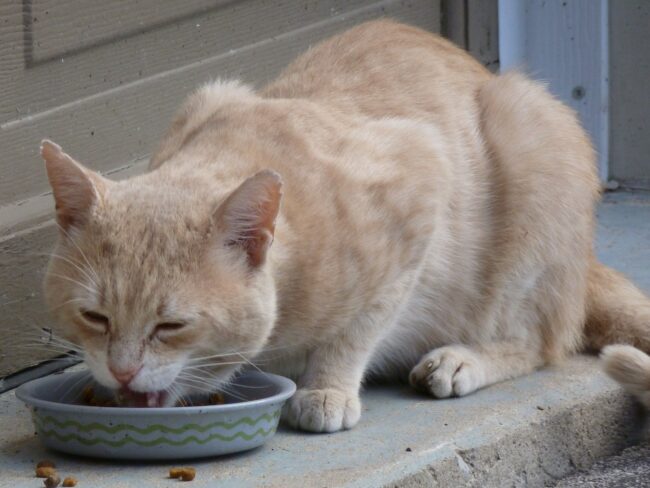Table of Contents
When you adopt a stray cat, you hope that things will go smoothly between you both. However, you are likely to face some problems in the first few days or weeks. one of the most common being the eating syndrome. Your former stray cat can show some strange and unexpected behavior for food that might concern you.
In this article, we talk about the reasons behind stray cat eating syndrome, its implications and solutions. We also discuss how you should feed a starving cat and provide nourishment as a part of emaciated cat care.
Stray Cat Eating Syndrome – UPDATED 2021
While it is completely normal for a hungry cat to behave differently, rescued or stray cats often exhibit weird behaviors that indicate it is an eating syndrome or food obsession. If your cat seems to be hungry all the time, it is something you should address at the earliest. There are several reasons for this problem.
The first obvious reason your cat is obsessed with food is an eating disorder like overeating. It may have developed the condition of emotional eating from stress or anxiety. As a former stray cat, the feline is likely to be insecure about food supply. Animals living in the wild are not sure about their next meal, so they tend to eat greedily whenever they have something to feed on.
Believe it or not, this behaviour is likely what kept the stray cat alive before you rescued or adopted it. As their feeding time is not fixed, it is used to eating anything, anytime. Your pet may have a history of living in a competitive environment where it developed the tendency to grab the opportunity to eat whenever food is available. It can take some time for the cat to realize that the household has sufficient food for its meals and should not feel insecure about it.
A Complete Guide To Emaciated Cat Care
A stray cat you rescue or adopt is likely to suffer from food obsession for one of many reasons. You can help it by feeding it at scheduled times and taking care of its nutrition requirements. An emaciated cat should only be given wet foods for the initial days as it recovers from malnutrition, and its daily diet should focus on cooked foods.
Another consideration for starving cats is avoiding giving too much food at once. You should try and divide its daily calories into smaller meals separated by a few hours. You should also cook the canned fish before giving it to a rescued cat, as it may not be able to digest it. It is also important to check the labels of canned foods to avoid harmful elements.
As a part of your emaciated cat care routine, you can add vitamin supplements to refill the lost minerals and vitamins. Consider giving them supplements until their health improves. These supplements will boost their immunity and help them recover faster. An excellent addition to their diet is fish oil capsules. Apart from this, check the cat’s behavior after food consumption to find out if it digests well. If it shows any sickness symptoms, take the pet to a vet at the earliest.
Is Your Rescue Cat Always Hungry?
One of the biggest problems rescuers face is the food obsession with cats. The rescued cat often behaves like it is always hungry, even when you regularly feed it properly. This is quite normal and is associated with several reasons. The first thing you should consider is the physical health of your feline. It may be sick from conditions like diabetes or hyperthyroidism responsible for excessive hunger. These diseases can be managed with medication, so it is best to consult a vet and get the cat examined.
Another reason a rescue cat eats too much is a lack of nutrition. It may not get the daily nutrition it needs, making it feel hungry even after being fed. This problem can be resolved easily by switching to nutrient-rich foods. It is also possible that the cat has intestinal worms that feed on the food it eats. Deworming can solve this problem and restore its appetite to normal levels. Rescue cats can also suffer from eating disorders related to depression or anxiety. You can encourage the cat to play and be happy or schedule an appointment with the vet to identify the problem.
How To Help A Malnourished Cat?
A malnourished cat should first be checked for medical problems that might have caused weight loss. The most common conditions include kidney and liver problems, intestinal issues, diabetes, hyperthyroidism, dental diseases and cancer. Take the cat to a vet who performs tests to diagnose and rule out these diseases and provides the necessary treatment.
One of the best things you can do for a malnourished cat is to give it high-quality foods with proper nutrients. You can also consider giving it supplements and vitamins to restore its health and weight quickly. Probiotics are some of the most beneficial foods that improve the pet’s gut health. Your cat can also get vitamin B12 supplements or injections. The vet may also advise deworming and treating the cat for parasites.
Best Food For Malnourished Cat
A malnourished cat has special requirements when it comes to food. A rescued or stray cat has always survived on waste so you must give high-calorie, nutrient-dense foods to these cats to help them regain weight and health. Canned and wet foods are the best options for malnourished cats. This is because their stomach condition is not good, and they can suffer if you give hard solids.
Wet foods like fish and turkey broth are excellent sources of calories and easy on the belly. You can even try homemade pork or beef broth combined with other semi-wet food. You can even give egg yolks to help them meet their calorie and protein requirement to gain weight quickly. You can consider buying canned foods for the cat from a pet store. Canned fish is a great choice for malnourished cats.

